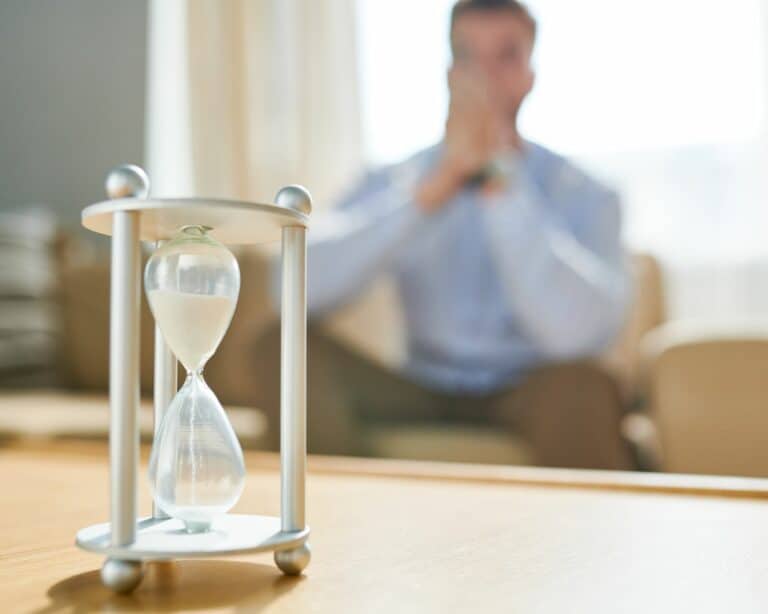Making the decision to stop drinking and go to an alcohol rehab near you is one of the most important decisions you’ll have to make. However, many people find that following through with this decision is difficult because they have to make it through the entire alcohol withdrawal timeline without picking up a drink.
During withdrawal, the brain goes into an overactive state as it tries to reach balance after becoming dependent on alcohol. This results in painful and even life-threatening withdrawal symptoms. Fortunately, alcohol detox centers can provide you with the support and medical care you need to stay safe during withdrawal.
Alcohol Withdrawal Symptoms
If you have become addicted to alcohol, it’s likely you’ve developed a physical dependence which makes quitting alcohol or going too long without a drink difficult. The symptoms that develop after abstaining from alcohol for a period of time are known as withdrawal symptoms. Symptoms of alcohol withdrawal include:
- Difficulty sleeping
- Nausea
- Vomiting
- Lack of appetite
- Shakes and/or tremors
- Increased heart rate
- Sweating
- Increased blood pressure
- Depression
- Anxiety
- Irritability
- Fever
- Impaired judgment
- Poor memory
- Confusion
- Sensitivity to light and sound
- Disorientation
- Headaches
- Hallucinations
- Seizures
- Delusions
A small percent of individuals experience delirium tremens (DTs), the most concerning symptom of alcohol withdrawal. DTs can lead to life-threatening complications like respiratory arrest, cardiac arrhythmia, sedation, and aspiration pneumonia. Although only 3-5% of individuals experience DTs, those that do require immediate medical attention. Without prompt medical care, DTs can be fatal.[1]
Both the intensity and duration of the alcohol withdrawal timeline depend on a variety of different factors.
Factors that Influence the Alcohol Withdrawal Timeline
How long alcohol detox takes varies from one person to the next depending on a variety of individual factors. These include:
- How long you’ve been addicted to alcohol – The longer you’ve been drinking and physically dependent on alcohol, the more severe and longer-lasting you can expect your withdrawal symptoms to be.
- How much alcohol you consume on a regular basis – The more alcohol you consume every day/week, the worse you can expect withdrawals to feel.
- Age, weight, and metabolism – The slower your metabolism, the longer it takes your body to process alcohol, and the longer your symptoms will last.
- Liver function – Alcohol is processed in the liver, and if your liver isn’t functioning correctly, it may take you longer to get through alcohol withdrawal.[2]
- Co-occurring health conditions – Certain co-occurring health conditions can complicate or lengthen the time you spend in alcohol detox.
Alcohol Withdrawal Timeline
Although the exact amount of time alcohol withdrawal takes varies from one person to the next, most people follow a general timeline that can be divided up into four stages.

Get The Care You Need and Deserve
Woburn Addiction Treatment is a leader in the addiction treatment field, with proven success in facilitating long-term recovery. Our team of top clinical & medical experts specializes in treating addiction coupled with mental illness, ensuring that each person receives individualized care. Call us – we’re available 24/day, 7 days/week.
Stage 1: Onset of Withdrawal Symptoms
Symptoms of withdrawal will begin 6-12 hours after taking your last drink. You may experience anxiety, headaches, stomach pains, insomnia, nausea, and poor appetite. You may also start having cravings for another drink.
Stage 2: Withdrawal Symptoms Peak
Between 12 and 72 hours, your withdrawal symptoms will begin to peak and can become severe. You may experience symptoms like sweating, confusion, fever, high blood pressure, and rapid heart rate. If you struggle with severe alcohol use disorder (AUD) and have been a chronic drinker for many years, you may also experience hallucinations, seizures, or delirium tremens (DTs).
Stage 3: Acute Symptoms Begin to Subside
After 72 hours, acute symptoms of alcohol withdrawal should begin to subside. Your fever may come down and your appetite may come back. You may still struggle with some discomfort and uneasiness. After days 5-6, most of your acute symptoms should be gone.
Stage 4: Post-Acute Withdrawal Syndrome (PAWS)
In severe cases of alcohol use disorder (AUD), some individuals experience PAWS. PAWS involves psychological symptoms of restlessness, irritability, discontent, sleep disturbances, and cravings. These can last for several weeks or months and are best managed with a comprehensive treatment program.[3]
How Long Do Alcohol Detox Programs Last?
Alcohol detox programs can provide you with a safe and secure place to stay during the entire duration of the alcohol withdrawal timeline. In most circumstances, alcohol withdrawal is treated using a benzodiazepine taper.[4] You may be prescribed a medication like Valium (diazepam) or Ativan (lorazepam) to take on a daily basis until your symptoms have subsided. Throughout your stay in detox, doctors and nurses will check your vitals and be available to answer any questions you may have.
The point of a medical detox program is not to rush you through the detox process. It is to ensure your safety, comfort, and sobriety during this difficult time. Most patients spend 4-7 days in a detox program for alcohol, however, this timeline can vary from one person to the next. Ultimately, how long alcohol detox lasts depends on the severity of your symptoms and your individual treatment needs.
Start Alcohol Treatment in Woburn, Massachusetts Today
The first step towards freedom from alcohol is detox. And although withdrawal symptoms can be difficult, medical detox programs provide pharmaceutical and clinical support to make the process easier. Don’t spend another day drinking–call us now to learn how our alcohol treatment programs in Massachusetts can help.
References:


